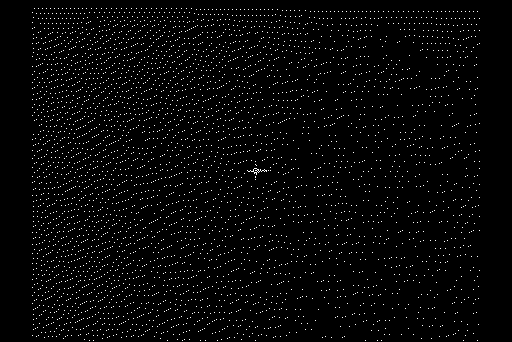New Adventures in 1-bit Video
Aug. 12th, 2021 08:49 pmHappening on news of a video player for the black-and-white “early Macs,” with the comment it ran best on the speedier SE/30, nudged me at last to bring up from my basement the moldering example of that particular computer I’d once been fortunate enough to have been given and sort out how to send its logic board away for repairs. Once I’d played some of “MacFlim’s” example videos on actual hardware, though, I was left pondering what more to do with the machine and the program. An encoder had been provided as source code; by looking up the show-stopping error produced when I tried to compile it in Terminal, I was even able to add one statement that got the command-line tool to encode. After stepping through the number of preprocessing tasks that had to be done with the more established command-line tool
Taking a break from MacFlim for a while (and managing to see my family in person after we were all vaccinated for the first time since Christmas), I returned to its repository to see an updated readme and a promise the encoder no longer needed so much preprocessing; in fact, it could even key into the now-infamous command-line tool
This elaboration on the strange exercise of “getting pictures on old computers” I’d been experimenting with in previous months is entertaining in its own way, although I do keep thinking it would have been harder to do when these Macs had been new and hard disks had been measured in megabytes. I’m also still sorting out how to get big files onto an existing “SCSI2SD” disk image; on an SE/30, the “Floppy Emu” only supports disk images the size of actual floppy disks, just enough for a few seconds of video (whereas the larger disks that can be loaded using it on a Macintosh Plus in a different mode load too slowly through the floppy port for the player to work). It is one thing that where testing the videos in Macintosh Plus emulation leaves a remnant border of the last frame of video around the edge of my full-screen wallpaper, on the SE/30 the whole screen does manage to restore. In any case, seeing reminders video playback has been worked out on other computers from the 1980s lends some more perspective.

ffmpeg set out in the readme, however, I had files of my own that I could import into the emulator Mini vMac but which just sprayed 1-bit static onto the screen and locked up the whole virtual system.Taking a break from MacFlim for a while (and managing to see my family in person after we were all vaccinated for the first time since Christmas), I returned to its repository to see an updated readme and a promise the encoder no longer needed so much preprocessing; in fact, it could even key into the now-infamous command-line tool
youtube-dl to acquire its video files. I tried again only to get the same garbled results, and then I happened to wonder about using the compiled player that had been provided alongside the example files versus the disk image of antique Macintosh source code to be compiled in that older environment. Checking time stamps on the source code had me hoping it might have been updated alongside the encoder. Knowing enough to “push a start button,” step out of the way, and hope just points out how far I am from really understanding computer programming of just about any complexity, but in the end I tried it and wound up with a new program that could play my own files (if not the examples any more).This elaboration on the strange exercise of “getting pictures on old computers” I’d been experimenting with in previous months is entertaining in its own way, although I do keep thinking it would have been harder to do when these Macs had been new and hard disks had been measured in megabytes. I’m also still sorting out how to get big files onto an existing “SCSI2SD” disk image; on an SE/30, the “Floppy Emu” only supports disk images the size of actual floppy disks, just enough for a few seconds of video (whereas the larger disks that can be loaded using it on a Macintosh Plus in a different mode load too slowly through the floppy port for the player to work). It is one thing that where testing the videos in Macintosh Plus emulation leaves a remnant border of the last frame of video around the edge of my full-screen wallpaper, on the SE/30 the whole screen does manage to restore. In any case, seeing reminders video playback has been worked out on other computers from the 1980s lends some more perspective.
